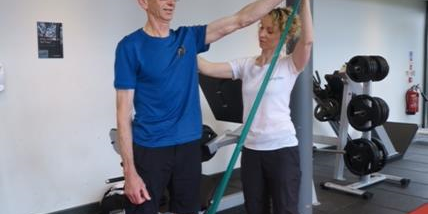Wellness and physiotherapy: It's not just about aches, pains and stiff joints
01 May 2020

Movement, balance and strength are the three cornerstones of the approach of PegasusLife’s Physiotherapist, Hannah Atkins, to keeping owners fit and healthy.
We had a chat with Hannah about the importance of Physiotherapy and how even the simplest exercises can make a big difference especially whilst staying at home in isolation.
Can you explain a little about what Physiotherapy is and when it is used?
For me Physiotherapy is about teaching and giving exercise a purpose. I teach people about posture, movement, balance and strength, to move well and get strong and give people ownership of their situation. I prefer a hands off approach, using verbal cues like soften your knees, unless I need to be more hands on. It depends on the individual. Broadly, I look at people’s deficits in respect of their strength and then I can devise a programme to help that individual get strong. It can be as much about prevention, ‘prehab’ rather than treating post injury and rehab. My aim is to reduce injury. There’s also a holistic element, using physio to improve psychosocial factors like sleep, diet or stress levels. Ultimately it’s about giving people confidence.
How can physiotherapy benefit the older generation, why is it so important?
Often it’s the small things. If turning to reverse your car is difficult, it can affect how active you can be which can become a big thing, so physio can help improve your range of neck and shoulder movement. Posture exercises such as lifting your arms over your head, can encourage you to sit up straight and not slump. Both become harder as we get older and have a disproportionate impact on our lives. It boils down to biomechanics, simple movements and education to make the difference between needing help and not needing help. Weight bearing exercise can help with osteoporosis and there are also exercises to improve peripheral vision and help balance.
Talk us through some of conditions that physio can treat? How do you tailor treatment to the individual?
In most cases I tend to treat a deficit or a weakness rather than a condition and tailor exercises to achieve lifestyle goals, using relevant verbal cues as they move. Parkinsons will need a more individual approach after the assessment as there are tools that are specific to an individual’s condition. With Osteoporosis, I would use resistance training and start at the right level and build up gradually, which evidence shows is safe and effective. In a class setting everyone might be at a different level so I ensure each individual works to their ability. Where chronic pain is concerned often its education, understanding how the body can become hyper sensitive and send too many pain signals and managing down the response.
With self-isolation now advisable for the over 70’s can you suggest some effective ways that owners can stay fit at home?
As exercise helps with relaxation and lowering anxiety, it is important to keep active for good mental wellbeing and as importantly to help reduce the risk of falls therefore preventing any hospital visits.
I’d recommend these three simple exercises:
- Lean on a kitchen work surface and doing half press ups
- Sit in a chair, shuffle to the edge and sit up straight and alternately straighten each leg. These are sit to stand movements so are good for strength, balance and posture.
- Walking up and down your home will help get your breathing rate up and improve muscle strength.
With each exercise start with a low number of reps and build up so it’s a little more challenging each time. The limiting factor will be different for all so do as many reps as you can and look to increase reps as you feel able. Always remember to take care how you do an exercise and not to overdo it.
Finally, tell us a bit more about your background and career and how you became a physio?
I studied and qualified in 2001 from Brunel University in London. After my two year rotation at Queens Medical Centre, Nottingham, I specialised in neurology and brain injury rehab and spent some time working for the wheelchair service and then in Northern Ireland working in a stroke unit. During the nine years working in the community with neurological patients in Manchester, I was visiting a client at home who then moved into Chapelwood (one of PegasusLife’s developments) and very kindly spread the word. I got chatting with Hollie, the Wellness therapist and from there started working with other owners which I love as I feel I’m part of a team striving for the same goal of providing the best lifestyle to owners.